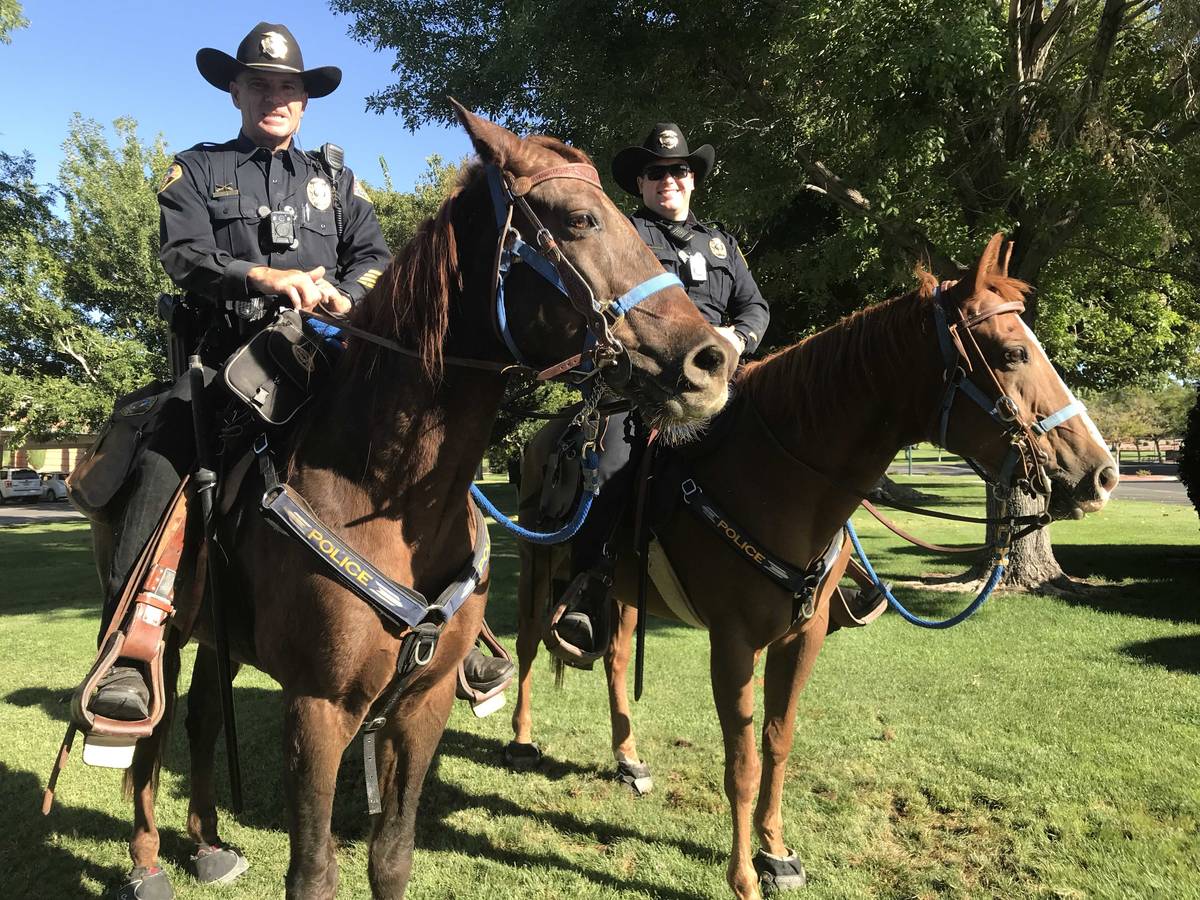Council makes voluntary mounted unit a department requirement
City Council passed an ordinance that requires the Boulder City Police Department to have a voluntary mounted unit against the advice of staff recommendations.
On Tuesday, Aug. 25, in a 4-1 vote, council approved a city code amendment making the voluntary unit a duty of the police department. Mayor Kiernan McManus requested the item be put on the agenda.
“That unit … brings a lot of pride, a lot of enjoyment to our city residents. … I believe that this is a function important to our city,” he said.
City Manager Al Noyola and Police Chief Tim Shea expressed concern about making the voluntary unit a duty of the police department within the city code. In a memorandum included with the agenda materials, Noyola wrote that staff recommended not proceeding with the item and that he and Shea were “blindsided” by it.
Shea said he was concerned about requiring the unit because it may be something that cannot be done in the future.
“I always want to meet requirements and standards,” he said. “I want to meet the expectations that are on us. If it’s a basic duty, if everything doesn’t line up right, all the different things we can’t control, and we can’t meet that basic duty, does that become a problem for us?”
Boulder City’s Mounted Police Unit is currently volunteer, meaning the city does not pay for it. The cost of obtaining and caring for the horses falls onto the officers who are in it. The unit’s staffing is also dependent on officers who are willing to do it.
Officers receive their regular salary while they are training, as the department pays for any type of additional skills required for the job.
Shea also said he did not want to set up a duty that could cause his successor to fail.
“This unit has been complimented on multiple occasions,” McManus said. “My intent with this is simply to say, ‘We feel as a policy of the city that we would like to have a mounted unit continue forward.’”
In his memorandum, Noyola wrote that the mayor’s request for an ordinance “is unusual and may circumvent council/manager form of government” and the “city charter leaves the daily operations of the city as the responsibility of the city manager.”
He also wrote that he and staff could not find another example in the city code where a volunteer group was a permanent part of a department.
“It appears to be completely out of the ordinary to establish a required voluntary unit that is not a basic policing function for a small police department,” Noyola wrote.
Shea wrote in another memorandum that he could not find any other examples of a municipality that established a specific unit within a municipal code as the basic duty of a department.
McManus said the city charter allows City Council to determine all matters of policy and that it can establish other administrative departments and distribute the work of its divisions.
“I think it’s important when we get into something where there’s some disagreement about what the council is allowed to do. It’s not so much what we’re allowed to do. It’s what the city charter says we are supposed to do,” he said. “And in this case we establish policy. And we distribute this work among the divisions of the city, of the different departments of the city.”
Councilwoman Claudia Bridges asked if the unit became part of the code would it change the city’s level of liability and responsibility.
Shea said that was one reason why he was concerned.
Councilman James Howard Adams mentioned a section of the city code that states the police department should recruit and train volunteer officers “to act as auxiliaries to the regularly appointed police personnel” and asked if the unit’s use of volunteers was different.
“That terminology is really pretty old,” Shea said.
He said reserve police officers used to be called auxiliaries and when he arrived the department had them but they were not commissioned reserve officers. They were the volunteers.
Currently, the police department has three reserve officers. They are not paid, have had special training and are restricted with what they can do.
“It’s problematic because it is getting very, very difficult to find people,” Shea added.
He also said his concern was “personal” because he liked to meet expectations and have the duties of the police department fulfilled.
Councilwoman Tracy Folda said she was concerned because the police department was doing something that wasn’t “on the books.” She also said if there weren’t available volunteers, a mounted unit would not be required.
“Voluntary means when you have a volunteer,” she said. “It’s not mandated.”
Bridges issued the one dissenting vote.
Contact reporter Celia Shortt Goodyear at cgoodyear@bouldercityreview.com or at 702-586-9401. Follow her on Twitter @csgoodyear.
Also at Tuesday's meeting, council:
▶ Approved renaming an executive secretary position to executive administrative assistant. The members also approved its continued funding and a staff directive to find a new person to fill the position as the current employee is retiring.
▶ Approved hiring a replacement police officer. The position is fully funded and the opening is due to an officer retiring.
















